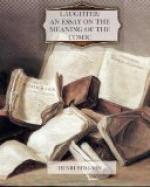1. The jack-in-the-box.—As children we have all played with the little man who springs out of his box. You squeeze him flat, he jumps up again. Push him lower, and he shoots up still higher. Crush him down beneath the lid, and often he will send everything flying. It is hard to tell whether or no the toy itself is very ancient, but the kind of amusement it affords belongs to all time. It is a struggle between two stubborn elements, one of which, being simply mechanical, generally ends by giving in to the other, which treats it as a plaything. A cat playing with a mouse, which from time to time she releases like a spring, only to pull it up short with a stroke of her paw, indulges in the same kind of amusement.
We will now pass on to the theatre, beginning with a Punch and Judy show. No sooner does the policeman put in an appearance on the stage than, naturally enough, he receives a blow which fells him. He springs to his feet, a second blow lays him flat. A repetition of the offence is followed by a repetition of the punishment. Up and down the constable flops and hops with the uniform rhythm of the bending and release of a spring, whilst the spectators laugh louder and louder.
Now, let us think of a spring that is rather of a moral type, an idea that is first expressed, then repressed, and then expressed again; a stream of words that bursts forth, is checked, and keeps on starting afresh. Once more we have the vision of one stubborn force, counteracted by another, equally pertinacious. This vision, however, will have discarded a portion of its materiality. No longer is it Punch and Judy that we are watching, but rather a real comedy.




